高一英语必修一unit3教学设计教学文案
- 格式:doc
- 大小:30.00 KB
- 文档页数:5
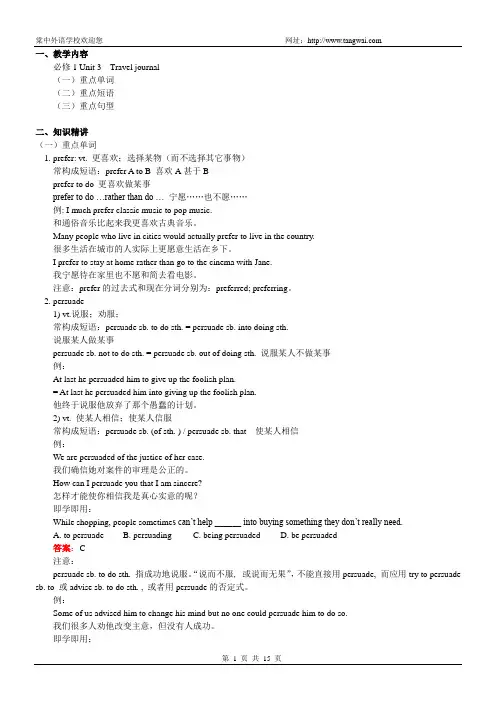
一、教学内容必修1 Unit 3 Travel journal(一)重点单词(二)重点短语(三)重点句型二、知识精讲(一)重点单词1. prefer: vt. 更喜欢;选择某物(而不选择其它事物)常构成短语:prefer A to B 喜欢A甚于Bprefer to do 更喜欢做某事prefer to do …rather than do … 宁愿……也不愿……例: I much prefer classic music to pop music.和通俗音乐比起来我更喜欢古典音乐。
Many people who live in cities would actually prefer to live in the country.很多生活在城市的人实际上更愿意生活在乡下。
I prefer to stay at home rather than go to the cinema with Jane.我宁愿待在家里也不愿和简去看电影。
注意:prefer的过去式和现在分词分别为:preferred; preferring。
2. persuade1) vt.说服;劝服;常构成短语:persuade sb. to do sth. = persuade sb. into doing sth.说服某人做某事persuade sb. not to do sth. = persuade sb. out of doing sth. 说服某人不做某事例:At last he persuaded him to give up the foolish plan.= At last he persuaded him into giving up the foolish plan.他终于说服他放弃了那个愚蠢的计划。
2) vt. 使某人相信;使某人信服常构成短语:persuade sb. (of sth. ) / persuade sb. that 使某人相信例:We are persuaded of the justice of her case.我们确信她对案件的审理是公正的。
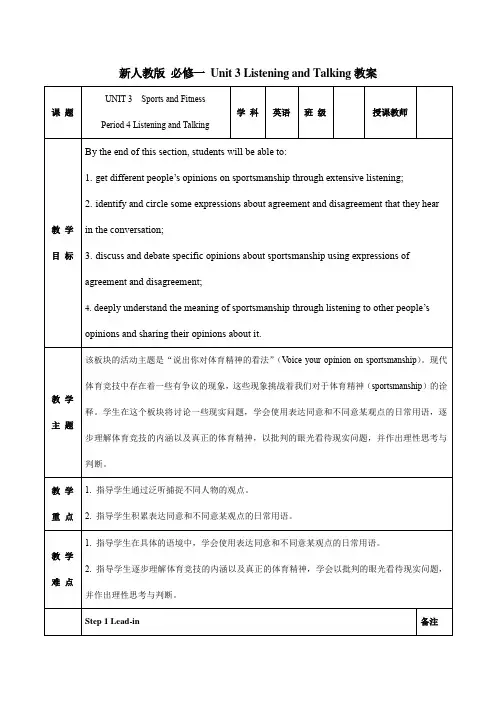
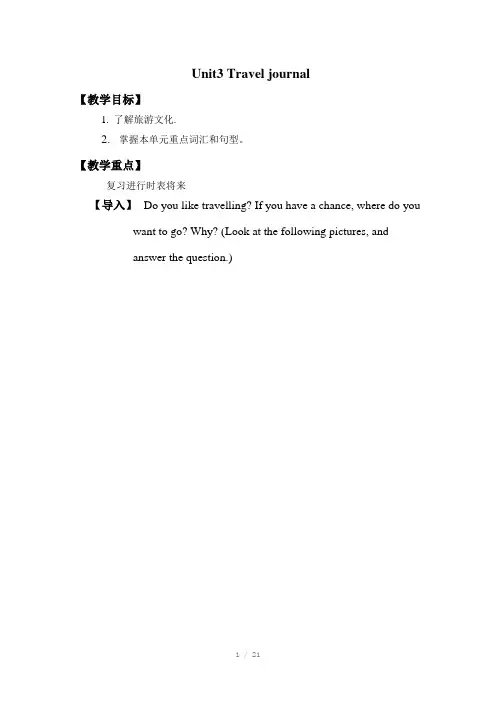
Unit3 Travel journal【教学目标】1.了解旅游文化.2.掌握本单元重点词汇和句型。
【教学重点】复习进行时表将来【导入】Do you like travelling? If you have a chance, where do you want to go? Why? (Look at the following pictures, andanswer the question.)安徽黄山重庆金佛山杭州西湖湖南张家界【短语回顾】1. 梦想做某事dream of/aboutdoing2. 毕业于(某大学)graduate from…3. 说服某人做.. persuade sb to do sth4. 在午夜at midnight5. 使某人对某事感兴趣rise one’s interest in sth 6. 做某事的最好方式the best way to do sth7. 坚持做某事insist on doing sth8. 坚持要某人做某事insist (that) sb (should) do sth 9. 改变主意change one’s mind10. 在…的高度at an altitude of…11. 下定决心做某事_make up one’s mind to do sth12. 向某人屈服give in to sb13. 穿过深pass through deep valleys14. 像往常一样as usual15. 鼓励某人做某事encourage sb to do sth16. 扎营make camp17. 搭帐put up a tent18. 迫不及待做某事can hardly wait to do sth19. 首先…其次…f or one thing,…..f or another,….20. 对熟悉be familiar with …21. 为某人所熟悉be familiar to sb22. 创纪录set a record23. 破纪录break a record24. 让步,投降give in25. 向某人问候say “h ello” to sb26. 喜欢be fond of一. 重点词汇讲解1. transport[用法] n.& v.运送;运输[搭配] air transport road transport[拓展] n. transportation运输;交通工具[练习] ⑴那辆黄色公共汽车将会把乘客从机场运送到城里。
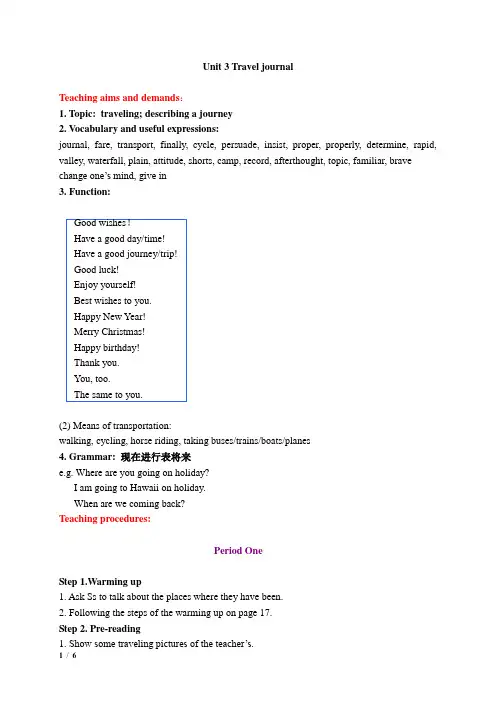
Unit 3 Travel journalTeaching aims and demands:1. Topic:traveling; describing a journey2. Vocabulary and useful expressions:journal, fare, transport, finally, cycle, persuade, insist, proper, properly, determine, rapid, valley, waterfall, plain, attitude, shorts, camp, record, afterthought, topic, familiar, brave change one’s mind, give in3. Function:(2) Means of transportation:walking, cycling, horse riding, taking buses/trains/boats/planes4. Grammar: 现在进行表将来e.g.Where are you going on holiday?I am going to Hawaii on holiday.When are we coming back?Teaching procedures:Period OneStep 1.Warming up1. Ask Ss to talk about the places where they have been.2. Following the steps of the warming up on page 17.Step 2. Pre-reading1. Show some traveling pictures of the teacher’s.2. Discuss: (1) Which river is the longest one in the world and which is the largest one; which river is the longest one in China.(2) How people who live along a river use it.Step 3. Reading1. After reading quickly and answer:What are they going to do?2. Ss read again and finish comprehending 1 on page 19.3. Ss read and get the main ideas of each paragraph.4. Ss list the countries that the Mekong River flows through.Step 4. After-readingSs in pai rs and discuss: Wang Wei’s and Wang Kun’s similar and different attitudes about the trip.Similar attitudes about the trip different attitudes about the trip.Both Wang Wei and Wang Kun think…1. Taking this trip is a dream come true.2. That they will enjoy this trip a lot.3. They should see a lot of the Mekong.4. That most of the Mekong will be found in Southeast Asia.Wang Wei believes…1. They must start in Qinghai where the river begins /see all of the Mekong.2. T hat they don’t need to prepare much.Wang Kun believes…1. it is too cold and high to start in Qinghai.2. that using an atlas is very important.Step 5. Homework1. Surf the internet and get more information about the Mekong River.2. Retell the passage use your own words.Period TwoStep 1. Warming upReview what Ss have learned and come to the new lesson.Step 2. Learning about the language1. persuade sb. into /out of sth.: cause sb. (not) to do sth. by arguing or reasoning with him 说服或劝说某人(不)做某事e.g. He is easily persuaded.You try and persuade her to come out with us.persuade sb. (that clause): cause sb. to believe sth.; convince sb. 使某人信服e.g. I am not fully persuaded by the evidence.2. insist v. : demand (sth.) forcefully, not accepting a refusal 坚持或坚决要求Since he insisted, I had to stay.insist on sth./doing sth.: require or demand; refuse to accept an alternative 一定要(某事物),坚决主张e.g. She insists on getting up early and playing her radio loud.3. care about: be worried, concerned or interested 忧虑,关心,惦念e.g. D on’t you care about anybody?I don’t care about what happens to him.care for /to do: be willing or agree to do sth.; wish or like to do sth.e.g. Would you care a drink?Would you care to go for a walk?care for sb.(1) like or love sb.e.g. He cares for her deeply.(2) look after sb.; take care of sb.; be responsible for sb.e.g. Who will care for your child if you are out?4. Once she has made up her mind, nothing can change it.once: adv.(1) for one time 一次e.g. I have only been here once.(2) at some time in the past 一度;曾经e.g. He once lived in Zambia.(3) all at once: suddenly 突然e.g. All at once the door opened.once conj.:as soon as 一旦;一…就…e.g. Once you understand this rule, you’ll have no further difficulty.Step 3. Practice1. Ss finish Ex 1 and 2 on page 20 by themselves.2. Check the answer.3. Ss do Ex 3. on page 20.4. Teacher gives Ss suggested answer and tell them why if the Ss have any problem.Step 4. Homework1. Learn the useful expressions by heart.2. Finish Wb. Ex1 on page 56.3. Finish Wb. Ex 2 on page 57.Period ThreeStep 1. RevisionCheck the answers of Wb Ex 1 and 2 on page 56 and 57.Step 2. Discoverig useful structures1. Ss look at the following sentences and underline the verbs. Let Ss themselves find the rules and tell what tense they are used.e.g. Are you working this evening?We’re having an English party this weekend.He is leaving tomorrow.2. Ss finish the dialogue on page 21 and pay attention to the tense.(Answers: are going, going, going/traveling, staying, are coming, coming, are going)3. Ss finish part 3 on page 21.Step 3. Talking1. Discuss the topic on page 55 in groups.2. Ss make a list about the objects: Which is the most useful and which is the least useful and why?3. Ss show their result to the class.Step 4. Speaking1. Discuss: What do you think a dam does to a river and the people who live on it?2. Make a list of some good and bad things a dam does.3. Discuss your report with your classmates and then show it in class.Step 5. HomeworkFinish Wb Ex 1 using structures on page 57.Period FourStep 1. Warming upAsk Ss some questions about Journey Down The Mekong (I).1. W hat was Wang Kun and Wang Wei’s dream?2. What can they see when they travel along the Mekong?3. Will they have some difficulties in their journey? What are they?Step 2. Reading1. Ss read the passage: A Night in the Mountains and answer the following questions:(1) How does Wang Kun feel about the trip now?(2) What do you think has changed his attitude?2. Ss make a dialogue about things happen the next morning before Wang Kun and Wang Wei leave their camp.3. Show the dialogue to the class.Step 3. Reading1. Read the passage: The End Of Our Journey on page 59.2. Ss fill in the form with the information from the travel journal.Period FiveStep 1. Listening1. Ss listen to part 3 and tick the words they hear on page 23.Step 2. ListeningSs listen to part 4 and finish Ex1 and 2 on Wb, page 55.Step 3. Listening task1. Ss listen to part 5 and finish Wb. Ex 1 on page 58.2. Ss listen to the tape again and fill in the information on the chart.Period SixStep 1. Pre-writing1. Ss read the passage and get the general idea about it.2. Ss make a list of details from the travel journal that you believe are real and you don’tbelieve are real.Step 2. Writing1. Ss write a short letter to Wang Wei as one of her friend and ask her to describe: how she feels, what she is doing, and some place you want to know about. Then wish her well on her journey by using some of the following expressions:Have a nice/good time.Have a nice/good trip.Good luck on your journey.Say “Hello” to …Give my love/best wishes to…Have fun.Take care.Write to me.2. Ss read their writing and check the mistakes by themselves.3. Ss exchange their writing and correct the mistakes.4. Ss rewrite the letter again.Step 3. After-writingChoose some samples and show them in class.Tips on writing:(1) Pay attention to the form of writing a letter.(2) Pay attention to the tense while writing.(3) Pay attention to the structures of the sentences.Step 4. HomeworkMake an advertisement or finish the project on page 61 in groups.。
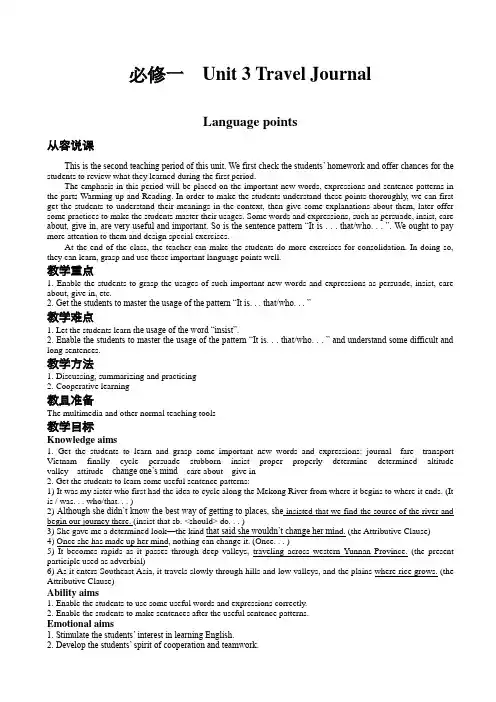
必修一Unit 3 Travel JournalLanguage points从容说课This is the second teaching period of this unit. We first check the students’ homework and offer chances for the students to review what they learned during the first period.The emphasis in this period will be placed on the important new words, expressions and sentence patterns in the parts Warming up and Reading. In order to make the students understand these points thoroughly, we can first get the students to understand their meanings in the context, then give some explanations about them, later offer some practices to make the students master their usages. Some words and expressions, such as persuade, insist, care about, give in, are very useful and important. So is the sentence pattern “It is . . . that/who. . . ”. We ought to pay more attention to them and design special exercises.At the end of the class, the teacher can make the students do more exercises for consolidation. In doing so, they can learn, grasp and use these important language points well.教学重点1. Enable the students to grasp the usages of such important new words and expressions as persuade, insist, care about, give in, etc.2. Get the students to master the usage of the pattern “It is. . . that/who. . . ”教学难点1. Let the students learn t he usage of the word “insist”.2. Enable the students to master the usage of the pattern “It is. . . that/who. . . ” and understand some difficult and long sentences.教学方法1. Discussing, summarizing and practicing2. Cooperative learning教具准备The multimedia and other normal teaching tools教学目标Knowledge aims1. Get the students to learn and grasp some important new words and expressions: journal fare transport Vietnam finally cycle persuade stubborn insist proper properly determine determined altitude valley attitude change one’s mind care about give in2. Get the students to learn some useful sentence patterns:1) It was my sister who first had the idea to cycle along the Mekong River from where it begins to where it ends. (It is / was. . . who/that. . . )2) Although she didn’t know the best way of getting to places, she insisted that we find the source of the river and begin our journey there. (insist that sb. <should> do. . . )3) She gave me a determined look—the kind that said she wouldn’t change her mi nd. (the Attributive Clause)4) Once she has made up her mind, nothing can change it. (Once. . . )5) It becomes rapids as it passes through deep valleys, traveling across western Yunnan Province. (the present participle used as adverbial)6) As it enters Southeast Asia, it travels slowly through hills and low valleys, and the plains where rice grows. (the Attributive Clause)Ability aims1. Enable the students to use some useful words and expressions correctly.2. Enable the students to make sentences after the useful sentence patterns.Emotional aims1. Stimulate the students’ interest in learning English.2. Develop the students’ spirit of cooperation and teamwork.教学过程设计方案(一)→Step 1 Revision1. Check the homework exercises.2. Ask some students to tell something about Wang Kun and Wang Wei’s bike trip or the Mekong River.→Step 2 Reading and practice1. Get the students to read the reading passage again to underline all the new words and useful expressions or collocations in the passage.Collocations: dream about, take a great bike trip, graduate from, get the chance to do sth. , cycle along the river, go for long bike rides, mountain bike, persuade sb. to do sth. , grow up, get sb. interested in sth. , the best way of getting to places, the source of th e river, care about, give sb. a determined look, change one’s mind, at an altitude of, an interesting experience, make up one’s mind, give in, a large atlas with good maps, keep doing sth. , pass through, be surprised to do sth. , half of, at last, the South China Sea2. Do the exercises in Discovering useful words and expressions on Page 20.→Step 3 CheckingExplain the problems the students meet while checking the answers.→Step 4 Language Points1. one-way fare single-way fare单程票价round-way fare往返/双程票价one-way ticket单程票round-way ticket往返/双程票2. dream about dream of 梦想,梦见(后接名词、代词或动名词)What a small world! I wouldn’t dream about/of meeting you here.世界真小,想不到会在这儿遇见你。
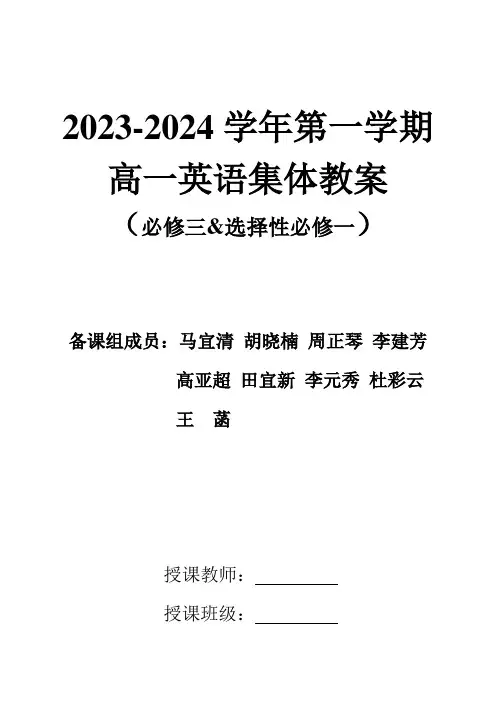
2023-2024学年第一学期高一英语集体教案
(必修三&选择性必修一)
备课组成员:马宜清胡晓楠周正琴李建芳
高亚超田宜新李元秀杜彩云
王菡
授课教师:
授课班级:
Book 1 Unit 3 Conservation
【单元教材分析】
本单元主题语境是“人与自然”,涉及的主题语境内容是环境保护,最终实现人与自然和谐相处。
本单元从听Linda Wei的讲座开始,引入塑料袋对环境的污染,然后又依次讲到犀牛的保护、物种灭绝的原因、后果和对策、Kevin和Alicia对塑料袋包装是否污染的讨论、英国的交通问题及对策以及工厂化养殖的利弊,帮助学生全面了解现阶段存在的人与自然不和谐相处的现状,使学生意识到保护环境,实现人与自然和谐相处的重要性,引导学生提高环保意识,为建设环境友好型社会做贡献。
【单元学习目标】
1.语言能力目标
能够理解人与自然相关的文章内容,听懂并谈论保护环境相关的话题,恰当使用所学词汇、句型描述环境问题和解决对策;能够通过议论文表达自己的观点和看法;能够为保护环境,保护动物提出合理的建议。
2.文化意识目标
能够通过了解人与自然不和谐相处的现状,树立正确的环保意识,为保护环境做贡献。
3.思维品质目标
能够通过比较、分析,准确获取语篇中有关环保问题和解决对策的相关信息,建立对人与自然关系的正确认识,并在此基础上联系自身实际,对环保问题表达自己的见解,提高环保意识,实现知识与思维能力的迁移。
4.学习能力目标
能够通过了解人与自然相处的现状,激发英语学习的兴趣;能够多渠道获取英语学习资源;能够选择恰当的策略与方法,监控、评价、反思和调整自己的学习内容和进程。
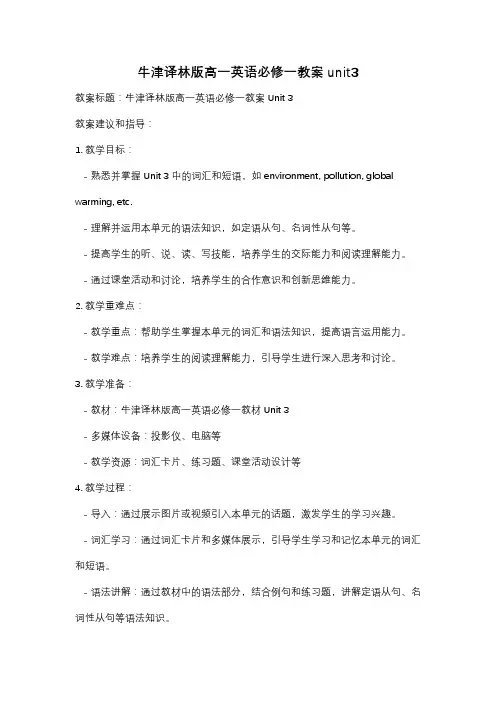
牛津译林版高一英语必修一教案unit3教案标题:牛津译林版高一英语必修一教案Unit 3教案建议和指导:1. 教学目标:- 熟悉并掌握Unit 3中的词汇和短语,如environment, pollution, global warming, etc.- 理解并运用本单元的语法知识,如定语从句、名词性从句等。
- 提高学生的听、说、读、写技能,培养学生的交际能力和阅读理解能力。
- 通过课堂活动和讨论,培养学生的合作意识和创新思维能力。
2. 教学重难点:- 教学重点:帮助学生掌握本单元的词汇和语法知识,提高语言运用能力。
- 教学难点:培养学生的阅读理解能力,引导学生进行深入思考和讨论。
3. 教学准备:- 教材:牛津译林版高一英语必修一教材Unit 3- 多媒体设备:投影仪、电脑等- 教学资源:词汇卡片、练习题、课堂活动设计等4. 教学过程:- 导入:通过展示图片或视频引入本单元的话题,激发学生的学习兴趣。
- 词汇学习:通过词汇卡片和多媒体展示,引导学生学习和记忆本单元的词汇和短语。
- 语法讲解:通过教材中的语法部分,结合例句和练习题,讲解定语从句、名词性从句等语法知识。
- 阅读理解:选择教材中的一篇阅读材料,设计问题和讨论活动,引导学生进行阅读理解和思考。
- 交流活动:设计小组讨论或角色扮演活动,让学生在小组内进行合作交流,分享自己的观点和想法。
- 语言运用:通过练习题和语言游戏,巩固学生对本单元词汇和语法的运用能力。
- 总结归纳:对本节课的重点内容进行总结和归纳,帮助学生理清思路和加深记忆。
- 作业布置:布置相关的作业,如课后练习题、写作任务等,巩固学生的学习成果。
5. 教学评估:- 通过课堂讨论、练习题和作业的批改,对学生的学习情况进行评估和反馈。
- 鼓励学生积极参与课堂活动,提高学生的学习兴趣和主动性。
6. 教学延伸:- 鼓励学生进行相关的课外阅读和研究,拓宽知识面和培养学生的自主学习能力。
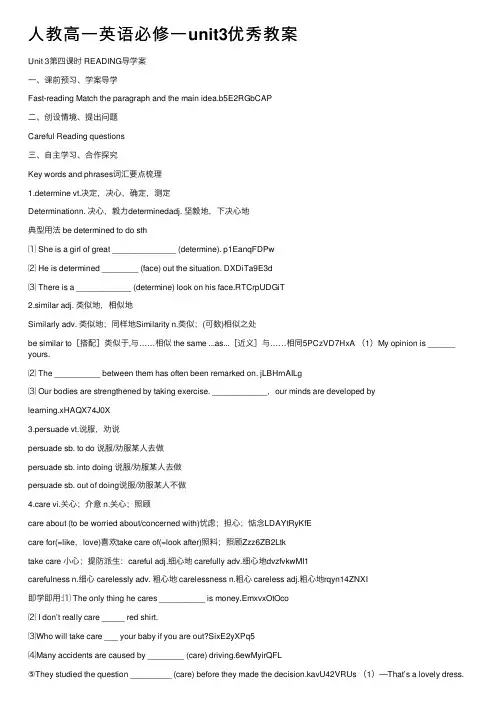
⼈教⾼⼀英语必修⼀unit3优秀教案Unit 3第四课时 READING导学案⼀、课前预习、学案导学Fast-reading Match the paragraph and the main idea.b5E2RGbCAP⼆、创设情境、提出问题Careful Reading questions三、⾃主学习、合作探究Key words and phrases词汇要点梳理1.determine vt.决定,决⼼,确定,测定Determinationn. 决⼼,毅⼒determinedadj. 坚毅地,下决⼼地典型⽤法 be determined to do sth⑴ She is a girl of great ______________ (determine). p1EanqFDPw⑵ He is determined ________ (face) out the situation. DXDiTa9E3d⑶ There is a ____________ (determine) look on his face.RTCrpUDGiT2.similar adj. 类似地,相似地Similarly adv. 类似地;同样地Similarity n.类似;(可数)相似之处be similar to[搭配]类似于,与……相似 the same ...as...[近义]与……相同5PCzVD7HxA (1)My opinion is ______ yours.⑵ The __________ between them has often been remarked on. jLBHrnAILg⑶ Our bodies are strengthened by taking exercise. ____________,our minds are developed bylearning.xHAQX74J0X3.persuade vt.说服,劝说persuade sb. to do 说服/劝服某⼈去做persuade sb. into doing 说服/劝服某⼈去做persuade sb. out of doing说服/劝服某⼈不做4.care vi.关⼼;介意 n.关⼼;照顾care about (to be worried about/concerned with)忧虑;担⼼;惦念LDAYtRyKfEcare for(=like,love)喜欢take care of(=look after)照料;照顾Zzz6ZB2Ltktake care ⼩⼼;提防派⽣:careful adj.细⼼地 carefully adv.细⼼地dvzfvkwMI1carefulness n.细⼼ carelessly adv. 粗⼼地 carelessness n.粗⼼ careless adj.粗⼼地rqyn14ZNXI即学即⽤:⑴ The only thing he cares __________ is money.EmxvxOtOco⑵ I don’t really care _____ red shirt.⑶Who will take care ___ your baby if you are out?SixE2yXPq5⑷Many accidents are caused by ________ (care) driving.6ewMyirQFL⑤They studied the question _________ (care) before they made the decision.kavU42VRUs (1)—That’s a lovely dress.—Do you think so?but I don’t thecolor.A.interested inB.care forC.take care ofD.fond of y6v3ALoS89(2)I don’t think Jack what happensto his family.He is so selfish.M2ub6vSTnPA.cares forB.cares aboutC.cares toD.cares of0YujCfmUCw5.attitude n. 态度;看法attitude to/towards ... 对……地态度翻译:我地英语⽼师改变了对我地态度.My English teacher ________________________ me.eUts8ZQVRd has changed his attitude to/towards me.6.be fond of(=love;like)喜欢;喜爱翻译:虽然她有好多缺点,但是我们都很喜欢她.sQsAEJkW5T She has many shortcomings,but we __________________her.GMsIasNXkA四、师⽣互动、引导点拨1.Ever since middle school, my sister WangWei and I have dreamed about taking a great bike trip.TIrRGchYzg1). dream n. v.dream of/about sth. (vi.)dream that… (vt.)dream sb. to be … (vt.)7EqZcWLZNX2. Then she persuade me to buy one.然后她动员我也买了⼀辆.persuade sb. (not) to do sth.=persuade sb. into / out of doing sth.lzq7IGf02E我已说服他做这件事.e.g. I persuaded him to do it.= persuade him into doing it. zvpgeqJ1hk3. It was my sister who first had the idea to cycle along the entire Mekong River from whereit begins to where it ends. 是我姐姐⾸先想到骑⾃⾏车沿湄公河从它地源头⾏⾛到⼊海⼝.NrpoJac3v1 这是⼀个强调句.强调句地结构是:It was/is+强调成分+that-/who-分句. 如果强调地部分是⼈,可⽤who,也可⽤that, 强调其他成分与内容都⽤that.强调时间和地点不能⽤when或where,只⽤that.1nowfTG4KIe. g.我看这部电影是在上海.(强调地点状语)It was in Shanghai that I saw the film. fjnFLDa5Zoe. g ⑴ All the students held ②a meeting③in the classroom④yesterday.tfnNhnE6e5⑴It was all the students that/who held a meeting in the classroom yesterday. HbmVN777sL(强调主语, was不能换⽤were)②It was a meeting that all the students held in the classroom yesterday. V7l4jRB8Hs(强调宾语 a meeting)③It was in the classroom that all the students held a meeting yesterday. 83lcPA59W9(强调地点状语,that不可换⽤ where)④It was yesterday that all the students held a meeting in the classroom. mZkklkzaaP(强调时间状语that不可换⽤ when)把这个句⼦地不同成分改成强调句.John gave Mary a handbag at Christmas.AVktR43bpw⾼考链接1).Was it ___ that I saw last night at the concert?ORjBnOwcEdA. youB. not youC. that yourself2).It was because of bad weather ___ the football match had to be put off.2MiJTy0dTTA. soB. so thatC. whyD. that gIiSpiue7A3).—Who is making so much noise in the garden?—______ the children.A. It isB. They areC. That isD. There are uEh0U1Yfmh4. Although she didn’t know the best way of getting get to places, she insisted that she organize the trip properly. 尽管她不知道旅⾏地最佳⽅式, 但是她还是坚决主张她来合理安排这次旅⾏.IAg9qLsgBX1) although, though引导让步状语从句不能再和but, and, however连⽤,although从句多放在句⾸, though从句可在主句前,中,后任何位置.WwghWvVhPE[考例] ______ he has limited technical knowledge, the old worker has a lot of experience.asfpsfpi4kA. SinceB. UnlessC. AsD. Although ooeyYZTjj12) insist : 坚持认为,坚持主张※insist on/upon one’s doing sth坚持做,坚决做e.g. I insisted on/upon his coming with us.※insist that +从句“坚持说”(后表⽰⼀个事实), 后接地从句⽤陈述语⽓,既按需要选择时态. e.g. He insisted that he hadn’t stolen the girl’s handbag.BkeGuInkxI ※insist that sb. (should) do sth. 坚决主张做某事,后接地宾语从句常⽤虚拟语⽓, 既“should +v.”e.g. Mary was ill. Her parents insisted that she (should) see a doctor.PgdO0sRlMo⾼考链接1). I insisted that a doctor __ immediately.A has been sent for B. sent forC. will be sent for D. be sent for3cdXwckm152).The doctor insisted that I a high fever and that I a rest for a few days. A.had;hadB.have;haveC.had;haveD.have;had h8c52WOngM3).The man insisted a taxi for me even if/though I told him I lived nearby.v4bdyGiousA.findB.to findC.on findingD.in finding5. My sister doesn’t care about details. 我姐姐是不会考虑细节地.J0bm4qMpJ9care about: be worried about忧虑,关⼼e.g. 他并不关⼼我地事情.He doesn’t care much about what happens to me.care for sb/sth: look after, love or like希望, 喜欢, 照顾XVauA9grYP1) He cares for her deeply.2) Who will care for your child if you are out?6. She gave me a determined look –the kind that she wouldn’t change her mind.bR9C6TJscw 她坚定地看了我⼀眼----这眼神表明她不会改变主意.determine v. 决定, 下定决⼼, 确定 determine to do sth. =make u p one’s mind 下定决⼼pN9LBDdtrd e.g. He determined to learn French. be determined to do sth. 决⼼做DJ8T7nHuGTe.g. She was determined to go to university.change one’s mind 改变某⼈地主意e.g. No matter what you say, I won’t change my mind.QF81D7bvUA7.at an altitude of = at a height of 在海拔……⽶处e.g. The plane is flying at a height / altitude of 10,000 feet.4B7a9QFw9h8. When I told her the air would be hard to breath and it would be very cold…ix6iFA8xoX当我告诉她将呼吸困难, 天⽓严寒……主语 + be + adj.+ to do sth. 是⼀常⽤句式既不定式⽤主动形式表达被动含义e.g. The problem is really hard to work out.My boss is easy to deal with.这类形容词有surprised, moved, disappointed, pleased, happy, sad, delighted, sorry, interested, glad, worried,etc.wt6qbkCyDE9. Finally, I had to give in. 最后, 我只好让步. give in (to sb./sth.) 屈服于, 让步, 递交Kp5zH46zRke.g. He had to give in to my views.\\ It’s time you gave in your papers.Yl4HdOAA61give up 放弃, 认输 ; give out 筋疲⼒尽;分配; ;give away 捐赠, 泄露ch4PJx4BlI练⼀练1) After the long trip, both the men and the horses ________.qd3YfhxCzo2) Because of his small salary, he had to _______ his dream trip to Europe.E836L11DO53) Seeing that he could not persuade me, he had to ___________ my view.S42ehLvE3M4) He _________ most of his fortune to the poor.5) Please keep the secret, don’t ____ it _____.思路点拨:gave out; gave up;gave in to ; gave away ; gave away501nNvZFis※ give in (sth. to sb.)屈服让步上交1) He would rather die than give in.2) Wang Kun had to give in because he knew his sister well.jW1viftGw93) Please give your examination papers in ( to the teacher) when you’ve finished.xS0DOYWHLP 选择题---Smoking is bad for your health ---Yes,I know. But I simply can’t ___.LOZMkIqI0wA. give it upB. give it outC. give it inD. give it away ZKZUQsUJed10. It becomes rapids as it passes through deep valleys, traveling across dGY2mcoKtTwestern Yunnan Province穿过深⾕流经云南省西部时它变成急流.词汇辨析: Across;through ; over prep. 穿过across 常表⽰从⼀定范围地⼀边到另⼀边或事物交叉位置, “横穿, 横跨”表⾯, 含义与on 有关rCYbSWRLIAthrough 表达两边穿过或穿过空间内部, 含义与in 有关over表⽰“越过”是指越过较⾼地物体从⼀侧到另⼀侧e.g. She swam ________the river.The river flows _________the city from west to east. FyXjoFlMWhWalk _______the square and go _________the gate, then you’ll come to the cafe. TuWrUpPObX The thief climbed______the wall and ran away.across ; through ;across ; through ;over实例:The new railway winds its way to Hong Kong, ___ mountains ___ tunnels and ___ rivers.7qWAq9jPqEA.across; over; throughB. over; across; . through llVIWTNQFkC. over; through; acrossD. through; over; across yhUQsDgRT1五、巩固练习、拓展提⾼A.写出下列单词地正确形式:1. He is planning his work _______ (进度表) for the following week.MdUZYnKS8I2. They took many pictures of the _________ (瀑布) yesterday.09T7t6eTno3. What is the ______ (海拔) of this mountain?4. I think you don’t know your own ___________. In fact, no one is perfect.e5TfZQIUB55. He is so s________ that nobody can change his mind.s1SovAcVQM6. Do you know where the s______ of the Changjiang River is?GXRw1kFW5s7.We are looking for someone who is (可靠地) and hard-working.UTREx49Xj98.We tried to p him to give up smoking,but he just wouldn’t listen.8PQN3NDYyP9.Though with great difficulty,I finished all my work f .mLPVzx7ZNw10.Excuse me,what is the f to London?Is $5 enough? AHP35hB02d11.The captain kept a j when he was at sea.He wrote down everything that happened.NDOcB141gT12.Your main d is your lack of job experience.1zOk7Ly2vA点拨:1.Schedule;2.waterfall;3.altitude;4.shortcomings;5.stubborn;6.source;fuNsDv23Kh7.Reliable; 8.persuade; 9.finally; 10.fare ; 11.journal ; 12.disadvantage tqMB9ew4YXB.课⽂原⽂重点句型再现1.Two years ago she bought an expensive mountain bike and then she persuaded me to buy oneHmMJFY05dE2. It was my sister who first had the idea to cycle along the entire Mekong River ViLRaIt6sk from where it begins to where it ends.3. Although she didn’t know the best way of getting to places,she insisted that she 9eK0GsX7H1 organize the trip properly.4.When I told her that our journey would begin at an altitude of more than 5,000 metres,naK8ccr8VIshe seemed to be excited about it.5.It makes wide bends or meanders through low valleys to the plains rice grows.B6JgIVV9aoC.⾼考连接【例1】The CDs are on sale!Buy one and youget completely free. (全国Ⅱ⾼考)P2IpeFpap5 A.other B.others C.one D.ones【例2】—I’ve read another book this week.—Well,maybe is not how much you read but what you read that counts.(浙江⾼考)3YIxKpScDM A.this B.that C.there D.it 【例3】 the police thought he was themost likely one,since they had no exact gUHFg9mdSsproof about it,they could not arrest him. (湖南⾼考)A.AlthoughB.As long asC.If onlyD.As soon as uQHOMTQe79D. 词组识记/英汉互译1. take a great bike trip 11. ⼭地车2. give me a determined look 12. 与…相似IMGWiDkflP3. change one’s mind 13.下决⼼做某事WHF4OmOgAw4. give in /give up5.make up one’s mind 14. 在海拔5000多⽶处aDFdk6hhPd6. have an idea 16. 沿着湄公河从源头骑车⾄终点ozElQQLi4T7. be fond of 17. 梦想做某事CvDtmAfjiA8. as usual 18. 说服某⼈做某事QrDCRkJkxh9. ever since10.care for版权申明本⽂部分内容,包括⽂字、图⽚、以及设计等在⽹上搜集整理.版权为个⼈所有This article includes some parts, including text, pictures, and design.Copyright is personal ownership.4nCKn3dlMX⽤户可将本⽂地内容或服务⽤于个⼈学习、研究或欣赏,以及其他⾮商业性或⾮盈利性⽤途,但同时应遵守著作权法及其他相关法律地规定,不得侵犯本⽹站及相关权利⼈地合法权利.除此以外,将本⽂任何内容或服务⽤于其他⽤途时,须征得本⼈及相关权利⼈地书⾯许可,并⽀付报酬.ijCSTNGm0EUsers may use the contents or services of this article for personal study, research or appreciation, and other non-commercial or non-profit purposes, butat the same time, they shall abide by the provisions of copyright law and otherrelevant laws, and shall not infringe upon the legitimate rights of this website and its relevant obligees. In addition, when a ny content or service of this article is used for other purposes, written permission and remuneration shall be obtained from the person concerned and the relevant obligee.vfB1pxanfk转载或引⽤本⽂内容必须是以新闻性或资料性公共免费信息为使⽤⽬地地合理、善意引⽤,不得对本⽂内容原意进⾏曲解、修改,并⾃负版权等法律责任.JbA9VhEou1 Reproduction or quotation of the content of this article must be reasonableand good-faith citation for the use of news or informative public free information. It shall not misinterpret or modify the original intention of the content of this article, and shall bear legal liability such as copyright.X7Ahr18pJI。
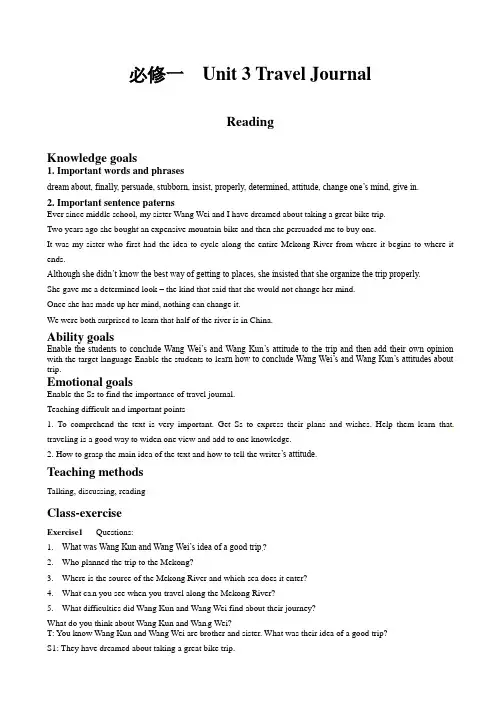
必修一Unit 3 Travel JournalReadingKnowledge goals1. Important words and phrasesdream about, finally, persuade, stubborn, insist, properly, determined, attitude, change one’s mind, give in.2. Important sentence paternsEver since middle school, my sister Wang Wei and I have dreamed about taking a great bike trip.Two years ago she bought an expensive mountain bike and then she persuaded me to buy one.It was my sister who first had the idea to cycle along the entire Mekong River from where it begins to where it ends.Although she didn’t know the best way of getting to places, she insisted that she organize the trip properly.She gave me a determined look – the kind that said that she would not change her mind.Once she has made up her mind, nothing can change it.We were both surprised to learn that half of the river is in China.Ability goalsEnable the students to conclude Wang Wei’s and Wang Kun’s attitude to the trip and then add their own opinion with the target language Enable the students to lea rn how to conclude Wang Wei’s and Wang Kun’s attitudes about trip.Emotional goalsEnable the Ss to find the importance of travel journal.Teaching difficult an d important points1. To comprehend the text is very important. Get Ss to express their plans and wishes. Help them learn that traveling is a good way to widen one view and add to one knowledge.2. How to grasp the main idea of the text and how to tell the writer’s attitude.Teaching methodsTalking, discussing, readingClass-exerciseExercise1 Questions:1.What was Wang Kun and Wang Wei’s idea of a good trip?2.Who planned the trip to the Mekong?3.Where is the source of the Mekong River and which sea does it enter?4.What ca n you see when you travel along the Mekong River?5.What difficulties did Wang Kun and Wang Wei find about their journey?What do you think about Wang Kun and Wan g Wei?T: You know Wang Kun and Wang Wei are brother and sister. What was their idea of a good trip?S1: They have dreamed about taking a great bike trip.T: Who planned the trip to the Mekong?S2: Wang Wei.T: What about Question 3?S3 The source of the Mekong River is in Qinghai Province and it enters the South China Sea.T: How about Question 4?S4: We can see a glacier, deep valleys, waterfalls, hills and plains.T: What difficulties did Wang Kun and Wang Wei find about their journey?S5: We know that the travelers had to climb over a Tibetan mountain and pass through deep valleys.T: You are right. Have you ever thought of traveling by bike?Ss: Yes/no.T: What do you think about Wang Kun and Wang Wei?S6: I think they are energetic and determined.T: Quite right. Now I’d like you to tell Wang Wei’s and Wan g Kun’s similar and different attitudes about the trip. You can have a discussion with your partners. And then fill in the chart. By the way, do you know the word “attitude”? An attitude is what a person thinks about something. Let’s start.Two minutes is enough. Teacher checks the answers and writes them down on the blackboard while the students are telling their answers.。
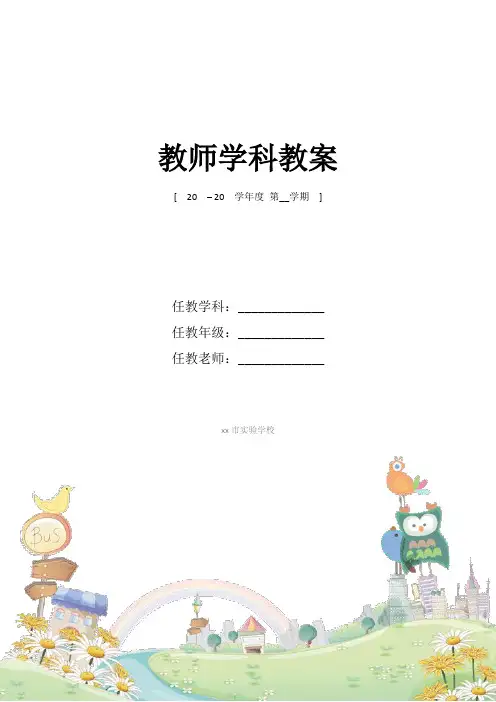
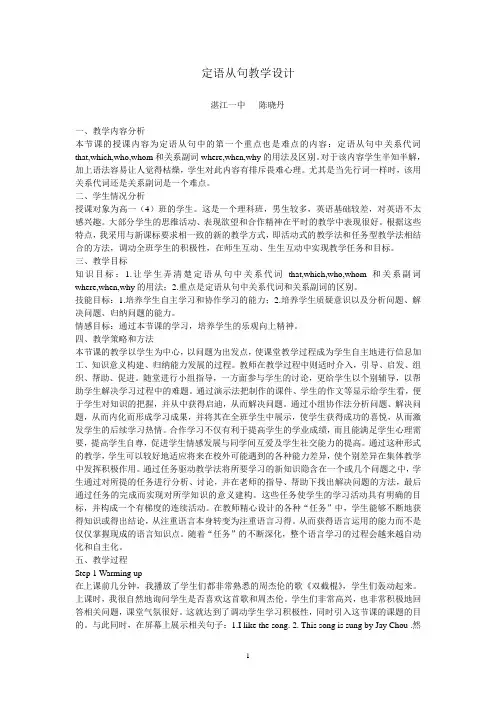
定语从句教学设计湛江一中陈晓丹一、教学内容分析本节课的授课内容为定语从句中的第一个重点也是难点的内容:定语从句中关系代词that,which,who,whom和关系副词where,when,why的用法及区别。
对于该内容学生半知半解,加上语法容易让人觉得枯燥,学生对此内容有排斥畏难心理。
尤其是当先行词一样时,该用关系代词还是关系副词是一个难点。
二、学生情况分析授课对象为高一(4)班的学生。
这是一个理科班,男生较多,英语基础较差,对英语不太感兴趣。
大部分学生的思维活动、表现欲望和合作精神在平时的教学中表现很好。
根据这些特点,我采用与新课标要求相一致的新的教学方式,即活动式的教学法和任务型教学法相结合的方法,调动全班学生的积极性,在师生互动、生生互动中实现教学任务和目标。
三、教学目标知识目标:1.让学生弄清楚定语从句中关系代词that,which,who,whom和关系副词where,when,why的用法;2.重点是定语从句中关系代词和关系副词的区别。
技能目标:1.培养学生自主学习和协作学习的能力;2.培养学生质疑意识以及分析问题、解决问题、归纳问题的能力。
情感目标:通过本节课的学习,培养学生的乐观向上精神。
四、教学策略和方法本节课的教学以学生为中心,以问题为出发点,使课堂教学过程成为学生自主地进行信息加工、知识意义构建、归纳能力发展的过程。
教师在教学过程中则适时介入,引导、启发、组织、帮助、促进。
随堂进行小组指导,一方面参与学生的讨论,更给学生以个别辅导,以帮助学生解决学习过程中的难题。
通过演示法把制作的课件、学生的作文等显示给学生看,便于学生对知识的把握,并从中获得启迪,从而解决问题。
通过小组协作法分析问题、解决问题,从而内化而形成学习成果,并将其在全班学生中展示,使学生获得成功的喜悦,从而激发学生的后续学习热情。
合作学习不仅有利于提高学生的学业成绩,而且能满足学生心理需要,提高学生自尊,促进学生情感发展与同学间互爱及学生社交能力的提高。
第三单元教学设计Unit 3 Lesson 3 Weddings教材分析本课是第三单元第三课。
本单元围绕weddings这个话题,旨在通过学习印尼的婚礼的习俗及希腊婚礼的过程,激发学生的学习兴趣和热情,通过观看录像,了解教堂婚礼典礼的程序和氛围,感受婚礼的气氛。
学生通过学习有关婚礼过程的词汇,使用略读和细读等阅读策略,从文章中提取信息,处理信息,学生从中了解英语国家人们在行为举止和待人接物等方面与中国人的异同。
通过呈现婚礼上的誓言,提高学生的兴趣和对婚姻的理解。
并针对学生在学习过程中结合实际考虑自己或者朋友将来的婚礼,从而有效地帮助学生树立正确的人生观和世界观。
本课的语法是情态动词的使用。
学生在语境中学习、理解和运用情态动词。
本课计划按两课时完成:第一课时重点是阅读文章,让学生学习印尼的婚礼的习俗及希腊婚礼的过程,并掌握有关婚礼过程的词汇,使用略读和细读等阅读策略,从文章中提取信息,处理信息;第二课时复习巩固有关婚礼过程的词汇,从课文中发现、归纳情态动词的使用方式,并设计具体情景来完成语言的产入和产出的过程。
教学内容话题:印尼的婚礼的习俗及希腊婚礼的过程(阅读)词汇:重点词汇:Bride, bridegroom, best man, entrance, invitation, even if, ceremon y, atte nd, indonesian, ought, contribute, Greek, crown, ribbon, link语法:情态动词的使用第一课时First Period教学目标在本课学习结束时,学生能够:1. 认读有关婚礼的相关词汇;2. 通过略读理解文章段落大意;3. 了解英语国家人们在行为举止和待人接物等方面与中国人的异同;4. 运用所学词汇设计自己或者朋友将来的婚礼;教学过程注:IP=Interactive Pattern; T=Teacher; Ss=Students; CW=Class Work; IW=Individual Work; PW= Pair Work; GW=Group Work第二课时Second Period教学目标在本课学习结束时,学生能够:1. 理解和使用情态动词;2. 运用情态动词给他人提建议;教学过程注:IP=Interactive Pattern; T=Teacher; Ss=Students; CW=Class Work; IW=Individual Work; PW= Pair Work; GW=Group Work。
Unit 3 Travel JournalPeriod1.Step 1.Warming up1.Ask some questions:2.Do you often travel? Where have you been?3.2. Following the steps of the warm-up on page 17.Step2. Pre-reading1. Show some traveling pictures of the teacher’s.2. Ask Ss : which river is the longest one in the world and which is the largest one; which river is the longest one in China.3. Ask Ss: how people who live along a river use it.Step3. While-reading1. Scanning: Ss read quickly and answer:What are they going to do?2. Skimming: Ss read again and finish comprehending 1 on page 19.Ss read and get the main ideas of each paragraph.Ss list the countries that the Mekong River flows through.Step4. After-readingSs in pairs and discuss: Wang Wei’s and Wang Kun’s simil ar and different attitudes about the trip.Similar attitudes about the trip Different attitudes about the tripBoth Wang Wei and Wang Kun think…1. Taking this trip is a dreamcome true.2. That they will enjoy this trip a lot.3. They should see a lot of the Mekong.4. That most of the Mekong will be found in Southeast Asia. Wang Wei believes…1. They must start in Qinghai where the river begins /see all of the Mekong.2. That they don’t need to prepare much Wang Kun believes…1. It is too cold and high to star t in Qinghai.2. That using an atlas is very important.Step5. Assignment1. Surf the internet and get more information about the Mekong River.2. Retell the passage use your own words.Period2.Step1. Warming upAsk some Ss to retell the passage that they have learnt last period.Step2. Learning about the languageTeacher explains some language points in the text on page 18.1.Persuade sb. into /out of sth. : cause sb. (not) to do sth. by arguing orreasoning with him 说服或劝说某人(不)做某事He is easily persuaded.Wang Kun couldn’t persuade his sister to change her mind. persuade sb. (that clause): cause sb. to believe sth.; convince sb. 使某人信服How can I persuade you that I am telling the truth?2.insist(v. ): demand (sth) forcefully, not accepting a refusal 坚持或坚决要求;eg. Since he insisted, I had to stay.insist on sth/doing sth: require or demand ; refuse to accept an alternative 一定要(某事物),坚决主张She insists on getting up early and playing her radio loud.3.care about: be worried, concerned or interested 忧虑,关心,惦念don’t you care about anybody?I don’t care about what happens to him.care for /to do: be willing or agree to do sth.; wish or like to do sth. Would you care a drink?Would you care to go for a walk?care for sb.1). Like or love sb.He cares for her deeply.2). Look after sb; take care of sb; be responsible for sbWho will care for your child if you are out?4.Once she has made up her mind, nothing can change it. 她一旦下了决心,什么也不能使她改变。
高一英语必修一u n i t3教学设计Teaching PlanUnit 3 travel journalThe topic of this unit centers on travel. Travel is very beneficial and attractiveactivity to the students who can gains a lot, such as, general knowledge ofgeography, politics, communicating skills and travel experiences. However, before traveling, we should do a lot of preparation. In this unit, language study includesome new words and useful expressions and the present continuous tense.Analysis of LearnersThis book fits the senior one students.The advantages of Ss:1.They are pretty active about what they are interested in.2.They are willing to share and demonstrate themselves in public.The shortage of Ss:1. Owing to the limited amounts of vocabularies , they always have difficulties in expressing thoughts and opinions in appropriate way.2. Sometimes they devoted themselves to the hot topic which they wereenthusiastic about so that they didn’t draw their attention on the knowledge weshould learn but just focused on the topic.Teaching PrinciplesWe should remember the main idea about the “Task-based language teaching”and “Situational teaching”.Among each part, “tasks” should be the line of the teaching. In order tocomplete the task, we teachers play a role as coaches instead of players. As a result,students are always the dominant role. Just give them an order, a tip, a hint or asuggestion to finish the task by themselves. Provide them more chances to speakand think.Teaching Aims and ObjectivesA. Knowledge and Grammar1. The students learn how to use the present continuous tense to indicate the future.2. Grasp the key vocabularies, phrases and sentences:journal,fare,transport,finally,cycle,persuade,insist,proper,properly,rapid,I prefer to...B. Ability1. The students learn how to make a travel plan.2. The students learn what the travel journal is and try to write their own ones.C. Feelings and Attitudes1. Sometimes we need not only do material preparation but also spiritualpreparation: courage, ambition, willpower and common sense.仅供学习与交流,如有侵权请联系网站删除谢谢22. Encourage students to work as a team.3. Encourage student to record what they saw, what they heard, what they thought. Motivate them to be active, optimistic and insightful to life by travel.Important Point of Teaching1. Learn how to correctly use the present continuous tense to indicate the future.2. Learn how to make a travel plan.Difficult Points of TeachingMake students understand “be+v.ing” can indicate something happening in the future.Teaching AidsA computer, text books, note books, exercise paper, blackboard.Teaching MethodsThe methods are Task-based Language Teaching, Situational Teaching Counseling-Learning Community Language Learning.Show some pictures about my travel and ask Ss to show their experiences.-------Situational TeachingPair work: Make a conversation...-------Situational TeachingSummarize the points.-------Task-based Language TeachingLearning Design仅供学习与交流,如有侵权请联系网站删除谢谢3Unit 3 travel journal1.Complete the following information card.2.Language points.Para1.___________________________________________________________________ ___________________________________________________________________ ___________________________________________________________________ ___________________________________________________________________ Para.2___________________________________________________________________ ___________________________________________________________________ ___________________________________________________________________ Para3___________________________________________________________________ ___________________________________________________________________ ___________________________________________________________________Practicing Plan仅供学习与交流,如有侵权请联系网站删除谢谢4Unit 3 travel journal一.Translation.1.他说服他的女儿改变了计划。
___________________________________________________________________ 2.他梦想成为一位科学家。
___________________________________________________________________ 3.他们坚持要求Tom参加这次会议。
___________________________________________________________________ 4.一旦我们进入教室,我们应当保持安静。
_____________________________________________________二.Fill in the blanks.Ever since our childhood,Tom and I ___________(dream )of______(take) a bike trip to Qinghai Lake. After__________(graduate)from college,we got a chance. Before we set out,we made a lot of__________(prepare). Tom persuaded me ______(buy) a mountain bike.I trust Tom,because he wasvery__________(determine).So he insisted that he _______(organize) the trip properly. It was from this special experience _______ I got a lot in my life.仅供学习与交流,如有侵权请联系网站删除谢谢5。